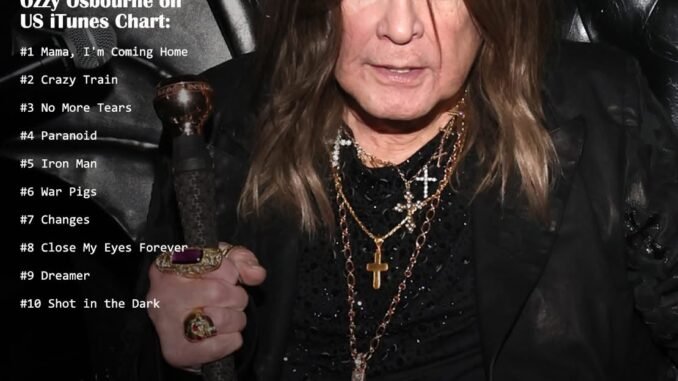
The Prince of Darkness Reigns Supreme: Ozzy Osbourne’s Music Storms the US iTunes Charts, Claiming All Top 10 Spots Following His Passing
In death, as in life, Ozzy Osbourne refuses to be silenced. Just days after the legendary rock icon’s passing, the world is once again roaring with the sound of his unmistakable voice, blistering guitar riffs, and the raw power of heavy metal. Fans around the globe have responded with an outpouring of emotion, launching Osbourne’s solo catalog to unprecedented heights on the US iTunes charts. In a historic and heartfelt tribute, the “Prince of Darkness” now reigns over the entire Top 10—each slot dominated by his unmistakable sound.
This chart dominance isn’t just a reflection of grief; it’s a testament to the timelessness of Osbourne’s music and the indelible mark he left on rock and roll. From the haunting melodies of “Mama, I’m Coming Home” to the anthemic rebellion of “Crazy Train,” Ozzy’s music continues to captivate, electrify, and inspire listeners across generations. It’s the kind of posthumous celebration few artists ever receive—and one that only someone of Osbourne’s cultural and musical stature could command.
A Legend Remembered
John Michael “Ozzy” Osbourne was more than just a singer. He was a force. Rising from the industrial streets of Birmingham, England, Osbourne first carved his name into music history as the frontman of Black Sabbath—the band often credited with inventing heavy metal itself. Songs like “Paranoid,” “Iron Man,” and “War Pigs” weren’t just rock tracks—they were seismic shifts in sound and attitude that defined a new era.
But it was as a solo artist that Osbourne truly came into his own. After parting ways with Black Sabbath in 1979, many predicted his star would fade. Instead, he exploded. With the release of Blizzard of Ozz in 1980, which featured the eternal classics “Crazy Train” and “Mr. Crowley,” Ozzy proved he was no mere passenger on Sabbath’s ride—he was a driving force.
Over the next four decades, Osbourne would release a string of critically acclaimed and commercially successful albums, all while defying the odds and surviving personal struggles that would have destroyed lesser men. Addiction battles, health scares, and controversies couldn’t dim his creative fire. Each comeback was louder than the last.
A Chart Takeover Fueled by Love and Legacy
Following news of his death, social media exploded with tributes from fans, fellow musicians, and celebrities, all paying homage to the man who helped shape the very soul of heavy metal. But it wasn’t just words that flowed—it was music. Fans rushed to download, stream, and relive the songs that defined their youth, soothed their pain, and gave voice to their rebellion.
As a result, Osbourne’s music surged on digital platforms, culminating in a truly astonishing feat: occupying all ten of the top spots on the US iTunes chart. The songs range from the early ‘80s bangers that introduced Ozzy to a new generation to haunting ballads and lesser-known deep cuts that showcase the full range of his artistry. Each track, in its own way, reminds us why Ozzy Osbourne wasn’t just a rock star—he was a legend.
More Than a Musician
Part of what made Osbourne’s legacy so enduring was his ability to reinvent himself without ever betraying his roots. He was a cultural chameleon, comfortable in a wide range of roles: reality TV star, festival founder, and even cartoon voice actor. MTV’s The Osbournes brought him into the homes of millions and revealed the man behind the myth—a loving, confused, and hilarious father navigating domestic life with his signature blend of chaos and charm.
But no matter how far his public persona stretched, he always returned to the music. That deep, snarling voice. The occult imagery. The stadium-shaking performances. Ozzy never let go of the stage—and neither did his fans.
The Impact of a Metal Messiah
Ozzy Osbourne’s influence stretches far beyond his own discography. Virtually every heavy metal, hard rock, or alternative artist of the past 40 years owes something to his legacy. Bands from Metallica to Slipknot to Foo Fighters have cited him as an inspiration. The annual Ozzfest tours provided a launching pad for countless acts, and his unapologetically weird aesthetic paved the way for generations of artists to embrace their eccentricities.
Even younger fans who weren’t alive during his peak have found themselves pulled into his world through TikTok trends, movie soundtracks, and streaming platforms. That’s the magic of true artistry: it transcends time.
Long Live the Prince
With his posthumous chart-topping success, Ozzy joins the ranks of musical titans like David Bowie, Prince, and Michael Jackson—artists whose deaths only amplified the cultural weight of their contributions. But in Ozzy’s case, it feels uniquely fitting. After all, he was always a figure of extremes: louder, wilder, darker, and—ironically—more alive than most.
Though the man may be gone, the music is immortal. Each guitar squeal, each guttural wail, each spine-tingling lyric is a part of Ozzy’s soul now echoing through eternity. Fans can find comfort knowing that every time they hit play, they’re not just remembering a legend—they’re keeping him alive.
So crank the volume, throw up the horns, and let the madness reign. Ozzy Osbourne may have left this world, but the Prince of Darkness will never die.
Long live the Ozzman. SKOL to the throne of metal.
Leave a Reply